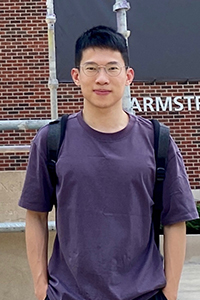International graduate student returns to campus, reflects on unprecedented year
Written By: Korina A. Wilbert

Zhixu “Rick” Yang never imagined that his first year as a Purdue PhD student in industrial – organizational psychology in the Department of Psychological Sciences would be spent living with his parents, taking classes in the middle of the night, and experiencing graduate school through a computer screen.
Grounded from traveling from his home in China to Purdue due to pandemic visa restrictions and unable to support himself due to the loss of his teaching assistantship, he made the best of a year interrupted.
Atul Sharma, a third-year PhD student in security and machine learning in the School of Electrical and Computer Engineering, was aware of growing coronavirus concerns when he flew home to India for a quick spring break trip in March 2020 to cure a case of homesickness.
He never imagined that it would be a year before he would return to the U.S. or that he was launching himself on a profound life-changing journey of personal discovery.
As Purdue welcomes international graduate students to campus this fall, some for the first time, some after a long, unplanned absence, there are new reflections on the 2020-21 pandemic year.
Many international graduate students took a pass on the year, electing to defer their enrollment. In fall 2020, 1,200 graduate students deferred enrollment—a staggering increase over the 223 deferrals the previous year. Approximately 90% of last fall’s deferrals were international graduate students.
But, many more international graduate students enrolled and watched, waited, and hoped for the best as the pandemic swept the globe.
Of the 3,684 international graduate students who planned to attend in-person on the West Lafayette campus for fall 2020, 6% wound up becoming part of the online cohort, many because they were unable to get visas to travel to the U.S.
This was the online cohort that Yang and Sharma were in.
A year interrupted
Yang, now a second-year PhD student, said that soon after he accepted the offer of admission to Purdue in 2020, he heard about the travel restrictions. “We never knew how long it was going to be,” Yang said. “We were hoping that we could at least get our visa right before the semester began, but that didn’t happen.”
As the travel restrictions were extended, hopes to travel to the U.S. for the 2020-21 year began to fade. “There was a lot of uncertainty and a lot of hope, but also disappointment.”
Yang knew he could defer enrollment, but he chose to study remotely. It meant he had to give up his teaching assistantship, expected income, and navigate his first year as a graduate student remotely.
“On the one hand, I think I’m just like all the students, even the students in the U.S., because we are all studying online for the past year,” Yang said. “On the other hand, I think the major challenge was the time difference. For Chinese students, we had a 12-hour time difference.”
Early in the pandemic, some of his classes and discussions were available only synchronously, which meant that he was doing coursework in the wee hours of the morning.
“It definitely affected me in many ways. I usually got up really late, sometimes even near noon. My biological clock was kind of messed up. I could not do my tasks in my optimal way.”
Yang was able to conduct his research online with some creative strategies, such as collecting data in an online platform, though he admits it was not as ideal as being on campus and in the lab.
“I also thought that if we were on campus, I would have had more chances to get connected with my cohort, other students and faculty, and I would have been able to attend more social activities. In that aspect, the connection with the university and other people was affected more negatively than in the academic way,” Yang said.
Attending graduate school remotely was but one of the adjustments Yang and many international graduate students had to make last year.
“After I graduated, I imagined that I would be financially independent of my parents in graduate school because I will get a salary with a TA or RA. But obviously, I didn’t have any extra funding during the past year. I could not manage to live on my own, completely independent. So I lived with my parents.
“Nothing could have been done differently. It was just something everybody had to experience. We all had to make these adjustments in our expectations about what our lives would have been last year.”
In August, Yang was able to get a visa and a direct flight to the U.S. and arrived at Purdue to begin a new research assistantship.
“I’m really looking forward to meeting my advisor and other students. I’m also looking forward to some in-person courses so we could have more active discussions,” Yang said. “I’m very, very grateful for my program, and my faculty advisor. I think they are all really supportive and understanding in that process. Without their support I could not have managed the previous year.”
A note of thanks to The Graduate School for allowing us to share this article. Original article can be found on The Graduate School website.
Discover more from News | College of Health and Human Sciences
Subscribe to get the latest posts sent to your email.